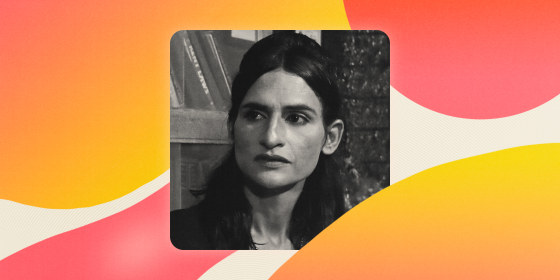[June is Pride Month, and this year we're celebrating by honoring 30 LGBTQ firsts. To see the full list, visit nbcnews.com/pride30.]
Nisha Rao went from begging for money on the streets of Karachi, Pakistan’s largest city, to becoming the country’s first transgender lawyer. Today, she seeks to use the law to make Pakistan a more equitable place for transgender people.
“I’m very proud to be Pakistan’s first transgender lawyer,” Rao, 28, told NBC News through a translator. “My community gave me a lot of courage.”
Rao grew up in Lahore, a city about 750 miles to the northeast of Karachi. She and her family knew from a young age that she was transgender, she said.
“They knew because of the way I was bullied, how I dressed up when I left the house,” Rao said.
Though Pakistan has made progress on transgender rights in recent years, being transgender in the majority-Muslim country still comes with challenges, including being socially ostracized.
“There are inherently a lot of problems with being transgender in Pakistani society,” she said. “Transgender people are targeted in society, and their friend groups, and people don’t see them as good people — they’re seen as bad. People are told to stay away from them.”
Transgender people were counted in Pakistan’s census for the first time in 2017, when they were said to officially number 10,418 in the country of more than 200 million people. But advocacy groups say the transgender population is likely far greater, with estimates ranging from 300,000 to 2 million.
Rao coped with being seen as an outcast by some by taking comfort in her transgender community. At 16, she left for Karachi, where she lived in a transgender colony and went on to earn an undergraduate degree in political science and economics and a master's degree in international relations from the University of Karachi. In 2018, she earned a law degree from Sindh Muslim Law College.
She funded her studies, she said, through a combination of loans and begging on the streets of Karachi for more than eight years, an experience she characterized as routinely dehumanizing. “People were very disrespectful toward me and didn’t believe that I begged for my education,” she said.
She begged by day and studied law by night, she said. After she received her law license in 2019, she began to represent mostly transgender people and cisgender women in harassment, divorce and child custody cases. She said she’s worked on more than 50 cases so far, with about 70 percent of them being pro bono. She earns most of her salary, she said, by working with a lawyer in Karachi’s city court, and she receives some financial support from her family.
Rao has seen improvements for transgender people in Pakistan, both under the law and in society, since she began her studies over a decade ago.
In 2009, the country’s Supreme Court ordered the full recognition of transgender people, mandating the provision of free medical and educational facilities, microcredit schemes and job quotas for transgender people in every government department. Then in 2012, trans people won a key legal battle to have a third gender option included on national identification cards.
Five years later, the government issued its first passport with a transgender category. The following year, 2018, a landmark law aimed at tackling transphobia required the government to establish safe spaces within medical and educational facilities where trans people would be free from harassment and allowed trans people to inherit property and to change their genders in official records.
“For the first time in Pakistan, the government is doing a lot of work,” Rao said of the country’s progress on transgender rights.
There’s much more to be done though, she added. Rao is currently working with other lawyers to help expand the protections afforded to transgender people under the landmark 2018 law, in part by implementing the job quotas for transgender people ordered in the 2009 Supreme Court ruling, which Rao said are not currently being enforced.
She also advocates for Pakistan’s transgender community outside of court, as founder and president of the Trans Pride Society, a nongovernmental organization that provides education, training and advocacy to transgender people in Pakistan. Rao also provides free legal advice and representation to transgender people through the organization, she said.
In August, Rao also co-founded Pakistan’s first Christian church for transgender people. A practicing Muslim, Rao was inspired to start the church after attending Mass with her transgender friends, who were unable to present as their true selves at church, she said. Based in Karachi, the church hosts weekly congregations of between 25 and 30 transgender people, according to Rao.
The church is a sacred space for them in more ways than one, as trans Christians in Pakistan are a minority within a minority in an overwhelmingly Muslim country. Even cisgender Christians and other religious minorities in Pakistan often face discrimination. But with Rao’s church, things have improved for her congregants.
“Christian transgender people [in Pakistan] now say they wait for Fridays to come every week so they can go to church,” Rao said.
Since Pakistan hosted its first Trans Pride march in December 2018, following the passage of the transgender rights bill earlier that year, Rao has been eagerly waiting the country’s next Pride celebration.
But before that, Rao hopes to take part in an even newer tradition: Last summer, she and other Pakistani transgender people brought trans pride flags and banners to Mazar-e-Quaid in Karachi, the final resting place of Pakistan’s founder, Muhammad Ali Jinnah. She hopes the tradition continues this year and in the years to come, with the goal of making all transgender Pakistanis feel at home in their country.
